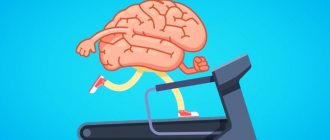Emotional stress is a set of emotional experiences that reduce the emotional background and motivational sphere of the individual. The state of emotional stress is accompanied by a feeling of a person’s helplessness in the face of life’s circumstances, one’s own uselessness, a feeling of loss of the meaning of life or the purpose of activity. The work is done formally, interest in others is supported by social requirements, apathy gradually begins to fill all areas of life. In the affective sphere, there is irritation, suspicion and nervousness, and various personal accentuations may become more active. The feeling of causeless anxiety and restlessness increases.
Fatigue increases, which does not go away either after rest or after a night's sleep, but increases even with minimal physical activity. Appetite may disappear, insomnia may occur, and a desire to relieve nervousness and relax with the help of alcohol and drugs may appear. When using various stimulants (even coffee), their effect is not pronounced, and sometimes the opposite.
Typically, this condition is caused by long-term suppression of negative feelings or problems, but when a person encounters this, the adjustment may require quite serious adjustments. In many cases, prolonged nervous tension leads to the development of stress, with all the ensuing consequences. If you ignore this symptomatology, then various neurasthenic disorders develop, the therapy of which also includes drug correction of the condition.
Timely relief of emotional stress helps to avoid serious consequences, but it is also worth taking care of preventive methods to prevent the accumulation of tension. Those who regularly have the opportunity to share their experiences with loved ones or a psychologist are less likely to accumulate a destructive amount of stress. Some of your own personality traits contribute to the accumulation of emotions inside - this is the constant need to control everything, the fear of trusting the flow of events, the inability to adapt to changing conditions, the desire to change others, and so on. Such tendencies take a lot of energy and force a person to constantly be in an active and mobilized internal state. It is worth constantly looking for something new in the ways of your own development.
The human psyche is designed in such a way that it is in a normal state only through constant improvement. During long periods of stability, degradation begins and emotional tension accumulates, which is associated not so much with the external situation and conservation of emotions, but with irritation from the lack of movement.
Stress and psycho-emotional tension
Stress is a state consisting of a complex of negative internal processes. Tension is individual moments that arise due to stress factors and entail serious consequences for the further development of a person.
These concepts indicate the psychological state of a person. Psycho-emotional stress causes physical and mental stress, characterized by a partial loss of control: in this state, a person overcomes difficulties without being sure of the result of his actions. Stress is the body’s reaction to factors that, for a number of reasons, the human mind perceives as overwhelming difficulties that cannot be overcome.
Types of nervous tension
Nervous excitation is characterized by a load on the central nervous system. In a state of stress, a person does not relax: at night he is tormented by nightmares, and in the morning he feels tired and apathetic. The nervous system does not recover. Mental stress changes the behavior of an individual, making a person aggressive and isolated from others. For convenience, there are two types of extreme mental stress:
- The inhibitory type is expressed in a person’s low adaptation to new conditions, when he cannot adapt to the assigned tasks at work and the requirements in the family. His reactions are inhibited and inadequate in relation to the situation.
- Excessive forms of mental stress (excitable type) are expressed in a change in the behavior of the individual: he withdraws from his usual habitat, becomes withdrawn and uncommunicative. Mental overstrain leads to rapid mood swings. This type of tension is characterized by increased aggression of a person who has experienced severe stress.
- Excessive or prohibitive forms of mental stress arise due to hypermobilization of the body (a person experiences an emotional breakdown).
- Exorbitant forms disrupt coordination of movement. Due to tension, confusion appears and concentration decreases.
Stress, tension, aggression
Symptoms of psycho-emotional problems
Nervous fatigue is reflected in a person’s behavior. His attitude to life, behavior and society changes. Symptoms of nervous tension:
- lethargy;
- apathy;
- inhibition of reactions;
- increased anxiety;
- depression;
- manic behavior (a person is focused on one task).
The symptoms and treatment of nervous tension are similar to stress relief methods. The primary goal is to reduce the level of anxiety and combat the main cause of this condition. Without medications, tension decreases gradually through an increase in a person’s activity and correction of his behavior.
Every symptom of nervous tension is accompanied by exhaustion of the human mind and body. Nutrition is disrupted, muscle tone decreases - the personality literally weakens before our eyes. A sign of problems in the body that arise against the background of mental stress: arrhythmia, hypertension, infectious diseases (malfunctions of the immune system), disturbances in the functioning of the intestines (constipation, diarrhea, increased flatulence).
Using Chewing Gum
Chewing gum will not only keep your teeth healthy, but also increase your resistance to stress. It is enough to actively work with your jaws for 3 minutes in order to achieve mental balance and reduce the intensity of stress. This fact is confirmed by research, the results of which were published in the Journal Of Prosthodontics Research.
The more intensely a person makes chewing movements, the faster he calms down. Moreover, chewing gum itself has nothing to do with this. The point is the fast work of the jaw muscles. These movements help reduce the level of catecholamines that appear in the body during stress. The fewer there are, the calmer the person is.
How to relieve tension
Methods for relieving psychological stress directly depend on the condition of the affected person. Anti-anxiety pills and psychotropic medications are prescribed by a doctor in cases where exercise and regular techniques do not produce positive results. Psychocorrection is a safe technique for adults and children.
Psychological counseling and psychocorrection
The state of mental tension consists of physical reactions that can be learned to control. The method for home use is based on the correction of the body's reactions. Through breathing exercises a person learns to control fear, and exercises against tension help to concentrate.
Proper relaxation technique
The easiest way to relieve tension is to instruct the body to change its external reaction. To relieve stress and nervous tension at home after a working day, you should take a walk in the fresh air.
The benefits of walking
Walking alone with your thoughts allows you to understand the reasons for the current situation and take your mind off the problem. Changing the environment helps you quickly calm down, relax your muscles and reduce overexcitement. It is better to take a walk before bed to relieve mental stress and prevent insomnia.
Exercise to relieve tension
The mental stress associated with overcoming imperfection is expressed in the behavior of the individual. She is tense and complex: her injuries are reflected in a person’s appearance and demeanor. He is stiff, stooped and clumsy. Gymnastics are used to combat internal tensions.
Relieve tension and stress:
- starting position – standing against the wall with your back extended;
- feet shoulder-width apart, arms extended forward (palms pointing down);
- as you exhale, the body slowly pulls upward; as you inhale, the weight of the body is redistributed over the entire foot.
The number of repetitions of the exercise depends on the physical fitness of the person. Psycho-emotional stress due to sudden changes at work or in your personal life is accompanied by panic attacks - this exercise will ease anxiety, and mental stress will disappear within 5-10 minutes.
Alternate body lifts with breath holds. A person needs to stretch out on his toes and tighten his abdominal muscles. As you exhale, the body relaxes and returns to its original position.
Preventing muscle tension: ways
Miotic tension can be relieved in several ways.
- Massage. You can do it yourself or hire a specialist to do it. Knowing how to relieve tension pain, a person will not risk his health, will learn to monitor it and correct his mistakes in time.
- Thermal impact. Taking a bath with essential oils or sea salt, relaxing under a warm blanket in winter - all this will help relieve a person of unpleasant sensations and improve his mood.
- Change of environment. Very often, the cause of tension in various muscle groups is stress. To prevent such a state, you need to make concessions to yourself, broaden your horizons, organize small holidays, get rid of complexes and old grievances.
- Physical training. Even the simplest of them will help to properly stretch, relax muscles, and soothe pain. By the way, exercise helps prevent pinched blood vessels and nerves. Such activities will help a person cope with his problem, and soon he himself will advise people how to relieve muscle tension through training.
- Proper organization of space. Such ordinary things as comfortable furniture, pillows, additional accessories for a mobile phone - all this not only makes life easier, but also helps to forget about muscle tension.
- Health monitoring. You can’t let illnesses get worse; you should consult a doctor in a timely manner.
- Breathing exercises. A person who has muscle tension must learn to breathe correctly. After all, thanks to this, all muscles and internal organs are enriched with oxygen.
- Using medications from a pharmacy. Fortunately, modern pharmacology today offers a large selection of different medications that relieve muscle tension. The main thing is to choose the right remedy that you can resort to if necessary. And this should be done after consultation with a specialist who can recommend a medication that is suitable for a particular patient.
Breathing exercises
To quickly relieve stress or nervous tension, you need to calm your breathing. As a reaction to fear and stress, a person experiences shortness of breath, suffocation, chest pain and uneven breathing. With the help of simple breathing exercises, psychological stress is reduced, and the person returns to a normal state. Breathing exercises are suitable for both men, women and children.
Breathing exercises to relieve tension are easy to remember:
- Starting position – sitting or standing. The person settles into a comfortable position with a straight, elongated back. It is important that the chest is smooth, straightened, and nothing interferes with calm breathing.
- Closing your eyes helps you distance yourself from what is happening around you. The exercise is carried out at home, at work or on public transport.
- The first breath is slow and deep. While inhaling, a person counts to himself to five. The air passes through the lungs, the stomach gradually rounds.
- Exhale slowly. You should exhale gradually, tensing your abdominal muscles, then releasing your lungs. The complex of inhalations and exhalations is like a wave that first fills a person and then releases him.
- You should inhale through your nose and exhale through your mouth.
- Between inhalation and exhalation, hold your breath for a few seconds.
Breathing exercises to relieve stress
A simple pattern of “inhale for 5 counts – hold your breath for 5 seconds – exhale for 5 counts” will help you relax your body and free your mind from anxious thoughts. Repeating the exercise helps to distract attention from the stress factor. Breathing exercises are performed for 10 minutes. The exercise is repeated 2-3 times a day.
Restoring the correct breathing rhythm normalizes a person’s mental state. Before going to bed, this exercise will help you fall asleep quickly and get rid of anxious thoughts.
Equipment for extreme situations
An effective method of relieving psychological stress in conflict situations is emergency measures. They use quick techniques to normalize the state in a stressful situation and to prevent a nervous breakdown. The “Boat” exercise helps a lot with a panic attack.
Starting position – sitting or standing. It is necessary to straighten your back and fold your arms in the shape of a boat (palms connected at chest level, elbows bent). In order to relieve stress and nervous tension, you should monitor your breathing for 3-4 minutes. At the fifth minute its frequency decreases. Calm, measured inhalations alternate with long exhalations. During inhalation, the lips are closed (inhale through the nose). After a few minutes, the body will relax and the mind will calm down.
Exercise for the eyes
- Perform circular rotations with the eyes, first clockwise and then counterclockwise.
- Keeping your head straight and motionless, you should look to the left, then to the right, up and down. You need to repeat the movement 15 times.
- Blinking your eyes rapidly for 20 seconds.
- Focusing attention. You should go to the window and fix your gaze on any point on the glass (for example, you can stick a chewing gum wrapper). Then you need to carefully examine the image in the picture (5 seconds), and then sharply look into the distance, concentrating on a specific distant object in the window. This is a great exercise to help relax the eye muscle. This is a good example of how to relieve eye strain. Moreover, such an exercise will not only help relieve fatigue, but also prevent muscle spasms of the organ of vision.
- Exercises in the dark: you need to thoroughly rub your palms together until you feel warm. Then fold your hands crosswise over your eyes so that your fingers intersect in the area of the “third eye.” The eyes should be in the dark, however, the palms should not press on them. Initially, floaters, spots and stripes will appear before your eyes. The exercise should be performed until complete darkness sets in. When performing this task, the eyes relax and rest.
All people know that movement relieves stress. Therefore, you should not sit for a long time in front of a TV or monitor screen or engage in activities that require visual concentration for a long time. Between breaks in work, you should do exercises for your eyes: move them, rotate them in different directions, blink, etc.
Calming herbs and aromatherapy
You can relieve stress in a relaxed home environment. Soothing tea and essential oils, incense and scented candles will create all the conditions for relaxation of the body.
Herbal infusions that are stored all year round help relieve internal tension. The following herbs are selected as a natural sedative: St. John's wort, oregano, chamomile and motherwort. Dilute the herbal taste of tea with honey, cinnamon or syrup. The composition of the collection is selected individually.
Herbal tea with honey
Getting rid of nervous tension at home is easy if you take baths with pine needles and essential oils once a week. Use 10 drops of oils (orange, cedar and lemon tree) added to a warm bath. This way you can relieve fatigue. After a bath, it is recommended to drink freshly brewed chamomile tea or a decoction with medicinal plants (lemon balm and mint).
The beneficial properties of oils are used to improve blood circulation, in the fight against colds and stress. Incense helps to relax: with the help of an aroma lamp and essential oils you can calm the nervous system. With the help of lavender, geranium and frankincense oil, a woman can relieve severe pain during menstruation (hormonal imbalance causes increased nervousness and psycho-emotional stress).
Treatment
If your eyes are constantly strained, experts recommend using certain treatment and prevention methods. In cases where tension is a consequence of dry eye syndrome, there is a need for special medical drops that moisturize the mucous membrane.
These include:
- Visine;
- Inoxa;
- Artificial tear;
- Oksial;
- Optiv;
- Systane;
- Slesin;
- Taufon.
If there is severe tension in the eyes, it is possible to use traditional medicine for instant relief and eliminate discomfort, pain and redness. However, before using traditional medicine, you should consult a specialist. The following remedies are effective for eye strain:
- cornflowers;
- clay;
- calendula;
- linden flowers;
- birch leaves;
- yarrow leaves;
- seaweed;
- dandelions;
- plantain;
- potato juice;
- chamomile flowers.
Each of these plant elements is suitable for preparing decoctions and tinctures suitable for use in the form of compresses and lotions. We must not forget about nutrition. You should enrich your diet with vitamins and microelements that are beneficial not only for the eyes, but also for the whole body.
Prolonged stress
The result of increased excitability (symptoms: irritability, apathy, confusion) is prolonged stress. A person has a headache, tremors in the limbs, joint pain, body aches - psycho-emotional problems lead to pathologies.
The attending physician prescribes medications that relieve physical symptoms. Psychoanalysis and work on lifestyle helps the individual get rid of stress and its consequences. The danger of a prolonged stressful state lies in the disruption of the central nervous system.
Mental disorders manifest themselves in people who have not struggled with constant emotional stress.
Causes
Each of the neuroses that arise in a person is a consequence of a high concentration of stress hormones, which are produced in the human body as a response to external aggression. Nature provides such a mechanism only for real danger - the threat of physical violence. Meanwhile, the modern rhythm of life is accompanied by constant tension in the body due to moral dangers - intellectual overload, holding grievances against people around us.
The stress hormone does not have time to be completely utilized, and nervous spasms appear:
- the brain receives a signal about a threat from the outside;
- it is necessary to prepare the body to repel an attack - imaginary or real;
- the hormonal glands receive a command to increase the need for biological active substances;
- a new portion of stress hormones enters the bloodstream;
- the muscles become toned - for the fight.
When faced with daily moral overload, stress disorders, or monotonous, monotonous work, tension in the abdominal or shoulder girdle muscles leads to a deterioration in well-being. The problem becomes widespread and requires medical intervention.
The right rhythm of life
You can avoid taking stress-inducing drugs if you plan your daily routine, create the right diet and take care of the health of your body. Remedies for stress cause drowsiness and affect human behavior, and folk remedies for stress are not dangerous. Useful habits developed while working on thinking and behavior will prevent stress in the future.
Sports activities
The following will help relieve internal tension:
- playing sports;
- new hobbies;
- trips out of town;
- new acquaintances and meetings;
- timely rest.
Working on your own thinking saves you from stress - the attitudes by which a person lives create his reactions. Stress resistance is developed through self-education and self-knowledge. If a person knows the cause of fear, he is not afraid of the future, he is not afraid of the unknown.
The daily routine is a balanced day, during which the body has time to rest and get the necessary load. The culture of food consumption allows you to get rid of such manifestations of stress as overeating or starvation.
Physical exercise
The ability to withstand stress is tantamount to the ability to control the body's spontaneous reactions. A tense body cannot relax and resist stress and its consequences. Physical activity is used to harden the body: running in the morning or in the evening before bed helps. While running, a person clears the mind and allows the body to release accumulated tension.
You can overcome stress if you cultivate resilience in the face of problems. Working on your body improves self-esteem. Development motivates an individual to new achievements, and group classes allow you to make promising acquaintances. Relieving stress through yoga is based on a combination of meditative techniques and physical exercise. A person learns to look at the world, people and the causes of stress differently. Relaxation is the key to harmony and well-being.
Finding new hobbies
Interests and hobbies are the foundation of a developing personality. The basis of art therapy (one of the best methods of dealing with prolonged stress) is the disclosure of a person, his fears and anxieties through art. Figures, compositions, paintings reveal the true traumas of the individual. Through art therapy, old emotional wounds can be soothed. A person who knows himself is not afraid of the world around him.
New activities bring impressions and positive emotions. Positive experiences save you from stress. They switch the personality away from the problem and make the experience less significant.
Rest and relaxation
Lack of rest ends in emotional burnout. The personality loses motivation and weakens. The less time a person devotes to rest, the more susceptible he is to external influence. Rest consists of distracted activities: picnics, going to the cinema, communicating with loved ones. Such activities give the body the necessary respite.
Relaxation is aimed at revealing the true desires of the individual. Away from work and family responsibilities, she can make the right decisions. A change of place is a signal of calm for the body.
Psychologist's advice
To independently reduce the level of anxiety, psychologists recommend the following.
- Put aside anxious thoughts . “This will only happen tomorrow, so today I won’t think about it, but rather read a book.” This method also helps to get rid of negative thoughts. You can read more about this in the article “How to get rid of negative thoughts and defeat destructive thinking.”
- Switch attention . For example, watching a fire burn or water running in a river, a person gradually calms down. Experiences fade into the background and no longer seem important.
- Reduce importance . “This is just an estimate. Yes, it will be very unpleasant for me to get a C or a D, but I prepared well. If something happens, I can retake the exam.”
- Remember and re-experience situations in which you were successful or proud of yourself.
- Do exercises . Sport helps overcome stress, increase brain activity, and take a fresh look at the situation.
Here's another good way to combat increased anxiety. Write down in your journal or notepad all the worries you are experiencing right now. After a month, read your notes. Most likely, none of this will come to fruition. Then you will understand that you were in vain to worry and come up with “horror stories”.










